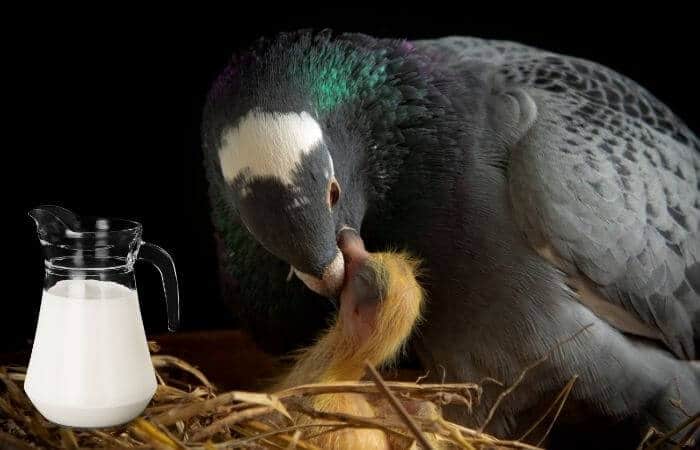Pigeons should not drink dairy milk however, baby pigeons are raised on crop milk which is a totally different thing altogether.
The average pigeon diet consists of seeds, grains, fruits and vegetables. Foraging pigeons may also eat small insects and worms.
There is no place in their diet for milk.
Pigeons should not be given dairy products since they are lactose intolerant.
However, newborn hatchlings consume crop milk, given to them by their mother and father.
In the case of baby pigeons, this milk is vital for their health and development.
Mating and Breeding
Most pigeon pairs mate for life. Once they have committed to each other, they are ready to breed.
The pair usually works together to build a nest in which the female lays her eggs.
The average pigeon clutch contains just one or two eggs at a time.
This is because pigeons cannot usually produce enough crop milk to feed more than two squabs at a time.
The mother pigeon incubates the eggs until they hatch and both the male and female continue to care for the babies until they are ready to leave the nest.
What is Crop Milk?
Crop milk isn’t the same as dairy milk.
It is a milk-like secretion that’s produced in a pigeon’s crop.
The crop is basically the equivalent of the human esophagus although it is comparatively larger in the pigeon.
It is a muscular pouch in the pigeon’s neck near the gullet/throat above the sternum.

The milk is produced in the crop and then regurgitated as used to feed the babies.
Crop milk is thicker and is higher in fat and protein than mammalian milk.
It contains a blend of nutrients, including antioxidants, as well as antibodies and bacteria.
This mixture helps promote a healthy start for the baby pigeons.
For newborn mammals, the nutrient-dense colostrum provided by their mothers is essential.
Colostrum is the milk that is taken on the very first suckle and is loaded with bioactive compounds that are needed for a good start in life. It is produced for the first few days after birth.
This is the same for pigeons. Hatchling pigeons rely on crop milk for their survival.
Crop milk initially is made up of 50-60 per cent protein and 30-40 per cent fat.
The minerals cover a wide spectrum but there will be a high level of nutrients to promote good bone development which supports the rapid growth rate of a baby pigeon.
The main difference to dairy milk (and other mammalian milk) is that crop milk does not contain the sugar lactose – hence the pigeon’s intolerance to lactose.
Squabs are fed pure crop milk for about the first week after they hatch.
After that, the mother and father pigeons soften adult food in their crop before feeding it to the babies.
Also Read:
What Do Pigeons Drink?
Why is Crop Milk so Important?
Because crop milk contains a range of nutrients, bacteria and antibodies, it’s necessary for the health of a baby pigeon.
The nutrients help the babies grow and develop, while the bacteria work to promote a healthy digestive system.
The antibodies help the development of the squabs’ immune system, warding off health issues now and as the babies get older.
Because baby pigeons are unable to digest seeds and the other foods they will eat as adults, they rely on crop milk for their survival.
Without it, most will perish as it’s their sole source of food in the days following hatching.
Unlike other species where the mother is the sole provider of milk for newborns, both the male and female pigeon can produce crop milk.
The mother and father regurgitate the liquid out of the crop and into the waiting mouths of the babies.
Because only a certain amount of crop milk can be produced, it’s the responsibility of both of the parent pigeons to make sure the babies are getting enough.
Pigeons have a very rapid growth rate. In fact, pigeons are one of the fastest growing warm-blooded creatures on earth.
They experience a more than 20-fold increase in weight in the first three weeks of their lives and this is attributed to crop milk.
Science knows that the milk contains a ”growth factor”.
Although it hasn’t been fully isolated and identified, laboratory experiments have shown that growth is stimulated in cell cultures “fed” with crop milk.
How is Crop Milk Made?
Production generally begins a few days before the babies hatch. Parent pigeons stop eating during this time so that there aren’t any seeds in the crop milk, which the squabs can’t digest.
The milk itself is made up of fat and protein cells that slough off the lining of the crop and form the thick liquid that is crop milk.
Pigeons are one of the only species of birds that feed their babies with crop milk. Others are the Emperor penguin and the Greater Flamingo.
It’s a critical way to ensure that squabs are getting the initial nutrition they need to grow and survive.
Unlike other species of birds, young pigeons are not fed insects or worms, but subsist almost entirely on crop milk in the early days of their lives.
Raising Orphaned Pigeons
It is possible to hand raise a baby pigeon in lieu of its parents.
It is usually achieved best with a syringe, the bird being fed with a specialty milk-like formula just like is available for other mammals including human babies.
But it should be noted that science has yet to replicate crop milk absolutely.
For this reason, it is better to try to find pigeon foster parents who are producing crop milk for their own chicks.
